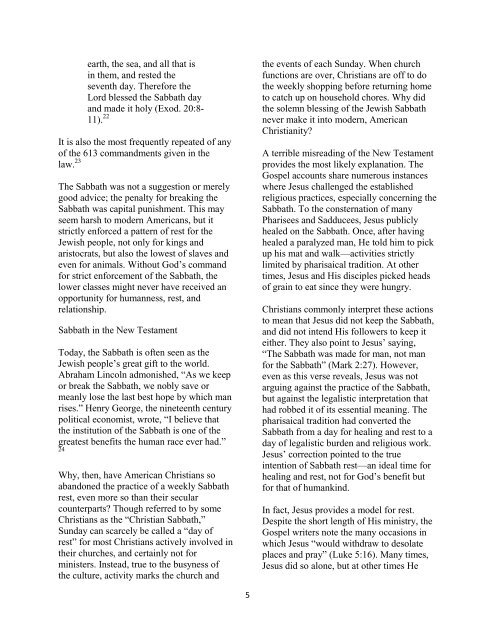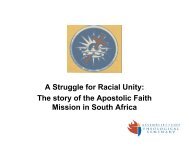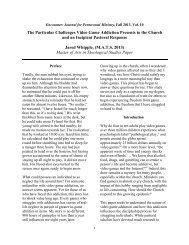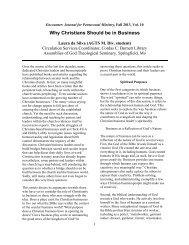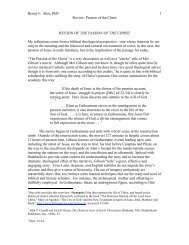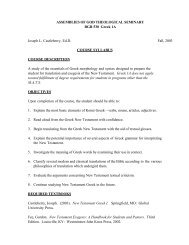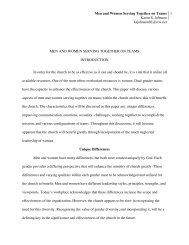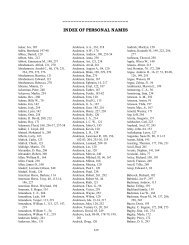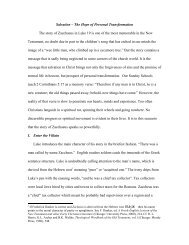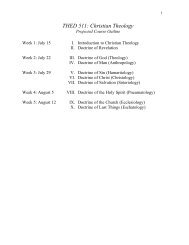Encounter: Journal for Pentecostal Ministry - Assemblies of God ...
Encounter: Journal for Pentecostal Ministry - Assemblies of God ...
Encounter: Journal for Pentecostal Ministry - Assemblies of God ...
You also want an ePaper? Increase the reach of your titles
YUMPU automatically turns print PDFs into web optimized ePapers that Google loves.
earth, the sea, and all that is<br />
in them, and rested the<br />
seventh day. There<strong>for</strong>e the<br />
Lord blessed the Sabbath day<br />
and made it holy (Exod. 20:8-<br />
11). 22<br />
It is also the most frequently repeated <strong>of</strong> any<br />
<strong>of</strong> the 613 commandments given in the<br />
law. 23<br />
The Sabbath was not a suggestion or merely<br />
good advice; the penalty <strong>for</strong> breaking the<br />
Sabbath was capital punishment. This may<br />
seem harsh to modern Americans, but it<br />
strictly en<strong>for</strong>ced a pattern <strong>of</strong> rest <strong>for</strong> the<br />
Jewish people, not only <strong>for</strong> kings and<br />
aristocrats, but also the lowest <strong>of</strong> slaves and<br />
even <strong>for</strong> animals. Without <strong>God</strong>’s command<br />
<strong>for</strong> strict en<strong>for</strong>cement <strong>of</strong> the Sabbath, the<br />
lower classes might never have received an<br />
opportunity <strong>for</strong> humanness, rest, and<br />
relationship.<br />
Sabbath in the New Testament<br />
Today, the Sabbath is <strong>of</strong>ten seen as the<br />
Jewish people’s great gift to the world.<br />
Abraham Lincoln admonished, “As we keep<br />
or break the Sabbath, we nobly save or<br />
meanly lose the last best hope by which man<br />
rises.” Henry George, the nineteenth century<br />
political economist, wrote, “I believe that<br />
the institution <strong>of</strong> the Sabbath is one <strong>of</strong> the<br />
greatest benefits the human race ever had.”<br />
24<br />
Why, then, have American Christians so<br />
abandoned the practice <strong>of</strong> a weekly Sabbath<br />
rest, even more so than their secular<br />
counterparts? Though referred to by some<br />
Christians as the “Christian Sabbath,”<br />
Sunday can scarcely be called a “day <strong>of</strong><br />
rest” <strong>for</strong> most Christians actively involved in<br />
their churches, and certainly not <strong>for</strong><br />
ministers. Instead, true to the busyness <strong>of</strong><br />
the culture, activity marks the church and<br />
5<br />
the events <strong>of</strong> each Sunday. When church<br />
functions are over, Christians are <strong>of</strong>f to do<br />
the weekly shopping be<strong>for</strong>e returning home<br />
to catch up on household chores. Why did<br />
the solemn blessing <strong>of</strong> the Jewish Sabbath<br />
never make it into modern, American<br />
Christianity?<br />
A terrible misreading <strong>of</strong> the New Testament<br />
provides the most likely explanation. The<br />
Gospel accounts share numerous instances<br />
where Jesus challenged the established<br />
religious practices, especially concerning the<br />
Sabbath. To the consternation <strong>of</strong> many<br />
Pharisees and Sadducees, Jesus publicly<br />
healed on the Sabbath. Once, after having<br />
healed a paralyzed man, He told him to pick<br />
up his mat and walk—activities strictly<br />
limited by pharisaical tradition. At other<br />
times, Jesus and His disciples picked heads<br />
<strong>of</strong> grain to eat since they were hungry.<br />
Christians commonly interpret these actions<br />
to mean that Jesus did not keep the Sabbath,<br />
and did not intend His followers to keep it<br />
either. They also point to Jesus’ saying,<br />
“The Sabbath was made <strong>for</strong> man, not man<br />
<strong>for</strong> the Sabbath” (Mark 2:27). However,<br />
even as this verse reveals, Jesus was not<br />
arguing against the practice <strong>of</strong> the Sabbath,<br />
but against the legalistic interpretation that<br />
had robbed it <strong>of</strong> its essential meaning. The<br />
pharisaical tradition had converted the<br />
Sabbath from a day <strong>for</strong> healing and rest to a<br />
day <strong>of</strong> legalistic burden and religious work.<br />
Jesus’ correction pointed to the true<br />
intention <strong>of</strong> Sabbath rest—an ideal time <strong>for</strong><br />
healing and rest, not <strong>for</strong> <strong>God</strong>’s benefit but<br />
<strong>for</strong> that <strong>of</strong> humankind.<br />
In fact, Jesus provides a model <strong>for</strong> rest.<br />
Despite the short length <strong>of</strong> His ministry, the<br />
Gospel writers note the many occasions in<br />
which Jesus “would withdraw to desolate<br />
places and pray” (Luke 5:16). Many times,<br />
Jesus did so alone, but at other times He


